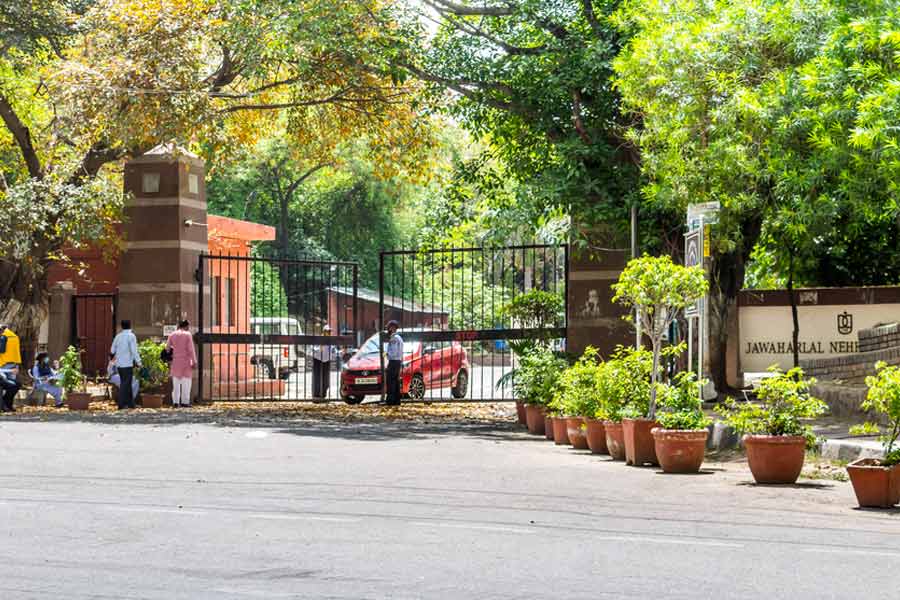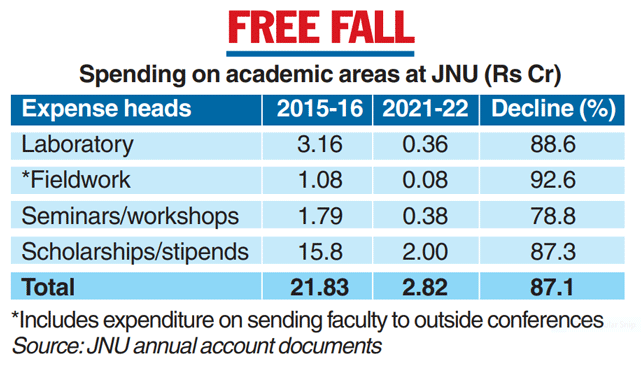Jawaharlal Nehru University's research spending nosedives since 2016


Expenditures under key academic heads such as laboratories, fieldwork and conference travel, seminars and workshops, and scholarships have witnessed drastic reductions of more than 80 per cent between 2015-16 and 2021-22 at Jawaharlal Nehru University.
With the spending cuts ranging from 92.6 per cent on fieldwork and conference travel to 78.8 per cent on organising seminars and workshops, JNU teachers have alleged that the university no longer prioritises academic activities and research.
The 87.3 per cent slump in the expenditure on scholarships and stipends, the teachers say, reflects the university’s increasing indifference to what once distinguished it — affirmative action for the welfare of disadvantaged students.
The university’s annual account reports show that under the head of running laboratories, JNU’s expenditures — not including the spending by project sponsors — declined from Rs 3.16 crore in 2015-16 to Rs 2.76 crore in 2016-17 and to Rs 2.4 crore in 2017-18.
It increased to Rs 2.82 crore in 2018-19, plummeted to Rs 0.45 crore in 2019-20, rose a little to Rs 67 lakh in 2020-21 and slipped to Rs 36 lakh in 2021-22.
The university’s annual expenditures on fieldwork and sending faculty to outside conferences were, from 2015-16 to 2021-22, respectively, Rs 1.08 crore, Rs 1.29 crore, Rs 0.84 crore, Rs 0.72 crore, Rs 0.2 crore, Rs 0.01 crore and Rs 0.08 crore.
On organising seminars and workshops, the university spent Rs 1.79 crore, Rs 1.12 crore, Rs 0.61 crore, Rs 1.48 crore, Rs 0.45 crore, Rs 0.1 crore and Rs 0.38 crore in these seven years.
On scholarships and stipends for students, the expenditures were Rs 15.8 crore, Rs 15.64 crore, Rs 18.23 crore, Rs 2.57 crore, Rs 2.4 crore, Rs 1.86 crore and Rs 2 crore.
Economics professor and former teacher association secretary Surajit Mazumdar said the university had witnessed a sharp decline in academic activities during these seven years.
“It’s very hard to quantify the changes in the academic atmosphere, but one can feel it everywhere,” he said.
Mazumdar said that unlike earlier, faculty members can now hardly attend international conferences unless the expenses are borne by the organisers.
Laboratory activities are somehow being managed by sourcing funds from research projects sponsored by the government, he added.

Scholarships
One key reason for the plunge in the expenditures on scholarships and stipends is a sharp decline in the number of undergraduate and postgraduate students being awarded the Means-cum-Merit Scholarships.
This is mainly because of a fall in JNU’s own revenues thanks to the varsity switching from holding its own research-course entrance tests – for which it charged candidates a fee – to outsourcing them to the National Testing Agency. Many JNU teachers feel that the agency’s MCQ tests are unsuited to assessing PhD candidates.
A second reason is a fall in the number of research students from 62 per cent of the total students in 2016-17 to 46 per cent in 2021-22 -- a 25 per cent decrease -- partly because of the UGC’s new rules that restrict the number of PhD students a single professor can supervise.
The university has also been delaying the payment of scholarships and stipends, sometimes for months, causing the students immense hardship.
Atul Sood, professor in the School of Social Sciences and a former JNU teacher association secretary, said the institution had witnessed a systematic undermining of its objectives as a public university.
He said that issues relating to finance and other varsity affairs were not thoroughly debated.
“The meetings of the academic council and the executive council have become a mere ritual. The members are not given the time to express their points of view,” Sood said.
He cited the example of a recent executive council meeting that approved 47 agenda items in just 27 minutes.
An email has been sent to vice-chancellor Santishree D. Pandit, seeking her comments on the decline in spending on core academic areas. Her response is awaited.